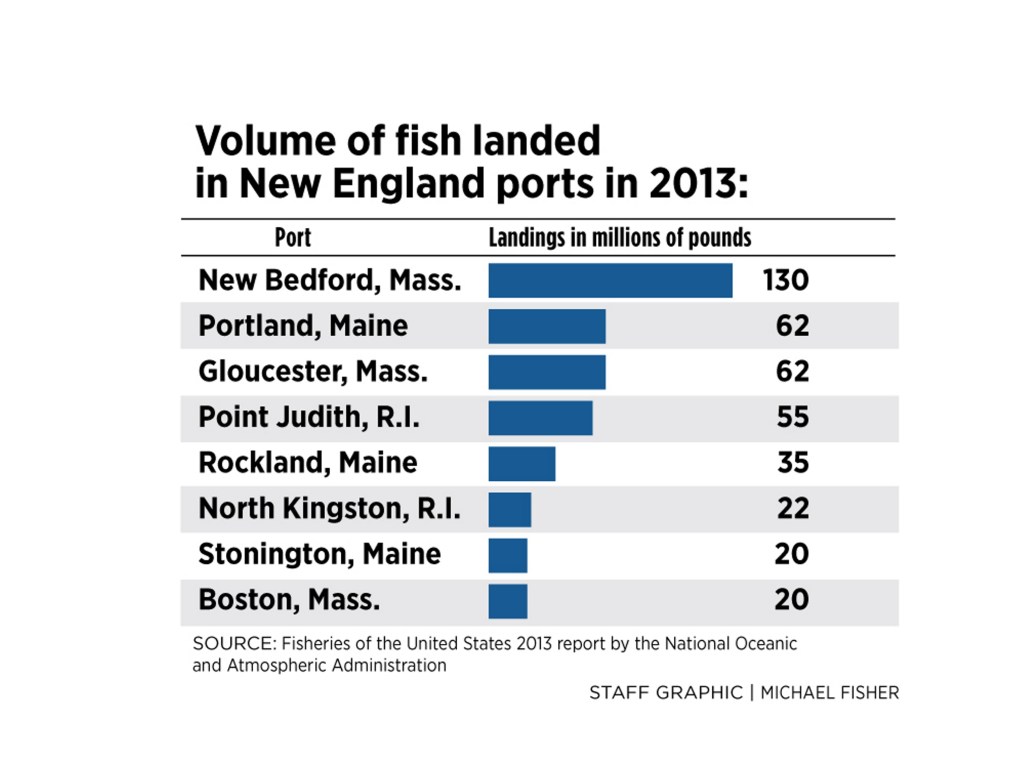While the port of Portland has finally pulled even with Gloucester, Massachusetts, in fish landings, it could be a hollow victory as federal regulators prepare to impose a new set of restrictions that will likely batter the groundfishing fleets in both ports.
The ports of Portland and Gloucester tied for second place in New England in commercial fish landings in 2013, according to an annual report released Wednesday by the National Oceanic and Atmospheric Administration. Fishermen in both ports landed 62 million pounds of fish.
New Bedford, Massachusetts, the nation’s top port for scallop fishermen, landed more than twice that amount – 130 million pounds – according to NOAA’s annual Fisheries of the United States report, making it the No. 1 port in New England by volume in 2013. It ranked No. 14 by volume nationally, valued at $379 million.
Portland’s catch was valued at $32 million, while longtime rival Gloucester reported $42 million. Portland’s lower value reflects that it lands more herring, a low-value fish.
In recent years, Portland has trailed far behind Gloucester in fish landings. In 2012, 59 million pounds were landed in Portland, versus the 83 million pounds landed in Gloucester.
Portland’s rise in the volume standings doesn’t mean Maine’s groundfish fleet is growing. Rather, it reflects the impact of tightening restrictions imposed on cod fishermen, said Bert Jongerden, general manager of the city-owned Portland Fish Exchange.
Jongerden said fish landings are more stable in Portland than in Gloucester because Maine fishermen catch mainly pollock and white hake, relatively healthy stocks with much higher harvest quotas than cod’s. Cod fishermen saw harvest quotas cut by 77 percent last year because regulators fear that cod stocks are in trouble.
“We are not gaining in volume, but seem to be holding our own,” he said. So far this year in Portland, landings are down slightly – about 100,000 pounds, he said.
Throughout much of the 1990s, Portland was the top groundfish port in New England until tighter catch restrictions were imposed in 2000, prompting many Maine fishermen to land their catches in Massachusetts, where there were no prohibitions against landing lobster bycatch – the lobsters accidentally caught while fishing other species.
Next year could be much harder for fishermen in both ports.
The New England Fisheries Management Council is drafting emergency measures to address plummeting cod stocks. With scientists saying that the cod population in the Gulf of Maine has collapsed and is now at historic lows, regulators are under pressure to enact measures to reverse the downward slide.
Some of the measures under discussion include closing large areas of inshore fishing grounds for much of the year and essentially prohibiting any Gulf of Maine cod landings by commercial or recreational fishermen.
The council is expected to make a decision when it meets in Newport, Rhode Island, from Nov. 17 to Nov. 20.
Maine fishermen say the scientists’ data is flawed and that cod stocks are relatively abundant in areas where they are fishing.
Cod intermingle with other groundfish. While Maine fishermen don’t target cod, they still catch them in their nets, Jongerden said.
As a result, if regulators put severe restrictions on the cod catch, fishermen who target other species, such as pollock and white hake, will suffer.
“You get choked out,” Jongerden said. “If they cut down on the codfish, you can’t catch the pollock and white hake. You have to have cod to catch those two.”
Maine’s lobster fishery is much healthier than the groundfish fishery, according to the NOAA report.
Nationally, American lobster landings were 150 million pounds, valued at $460 million.
Maine led in lobster landings for the 32nd consecutive year, with 127 million pounds valued at more than $368 million.
Massachusetts, the second-leading producer, had landings of 15 million pounds valued at $62 million.
Copy the Story LinkSend questions/comments to the editors.



Success. Please wait for the page to reload. If the page does not reload within 5 seconds, please refresh the page.
Enter your email and password to access comments.
Hi, to comment on stories you must . This profile is in addition to your subscription and website login.
Already have a commenting profile? .
Invalid username/password.
Please check your email to confirm and complete your registration.
Only subscribers are eligible to post comments. Please subscribe or login first for digital access. Here’s why.
Use the form below to reset your password. When you've submitted your account email, we will send an email with a reset code.